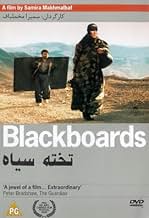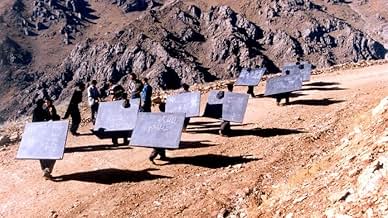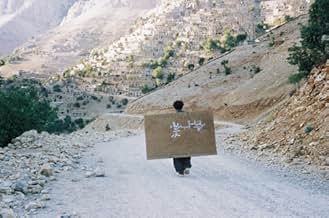Takhté siah
- 2000
- 1 घं 28 मि
IMDb रेटिंग
6.8/10
3 हज़ार
आपकी रेटिंग
अपनी भाषा में प्लॉट जोड़ेंKurdish teachers Said and Reeboir roam Iranian villages near Iraqi border during war. Said guides displaced men, marries widow Halaleh. Reeboir joins child smugglers. Amid danger, they try t... सभी पढ़ेंKurdish teachers Said and Reeboir roam Iranian villages near Iraqi border during war. Said guides displaced men, marries widow Halaleh. Reeboir joins child smugglers. Amid danger, they try teaching nomadic students while soldiers patrol.Kurdish teachers Said and Reeboir roam Iranian villages near Iraqi border during war. Said guides displaced men, marries widow Halaleh. Reeboir joins child smugglers. Amid danger, they try teaching nomadic students while soldiers patrol.
- निर्देशक
- लेखक
- स्टार
- पुरस्कार
- 3 जीत और कुल 3 नामांकन
फ़ीचर्ड समीक्षाएं
I understand the vigorous debate Samira Makhmalbaf's BLACKBOARDS, has generated, but I'd also say that I loved this very demanding but often moving film - a remarkable achievement for a very young, but already accomplished filmmaker. Watching her career develop will be quite a treat.
Shot with hand-held cameras and featuring a Kurdish cast of non-actors, BLACKBOARDS is very slowly paced, with a rambling quality that captures the aimless down time of everyday life. However the restless camera work also fills the film with an unceasing tension, gradually revealing the desperation filling the stateless existances of the many nervous characters.
The politics of the region are an ever-present backdrop to the story, and unfortunate political machinations render both education and basic survival an arduous complexity - to live and to gain even the most basic of educations are made into luxuries, which - even in desolate and strife-torn landscapes - some are willing to die for.
A handful of moments stood out for me: the scenes set in the river camp showcase the warmest of human interactions, and the final scene is remarkably beautiful.
This very rigorous film (superficially reminding me of both Abbas Kiarostami and Tsai Ming-liang) nonetheless had me hooked.
Shot with hand-held cameras and featuring a Kurdish cast of non-actors, BLACKBOARDS is very slowly paced, with a rambling quality that captures the aimless down time of everyday life. However the restless camera work also fills the film with an unceasing tension, gradually revealing the desperation filling the stateless existances of the many nervous characters.
The politics of the region are an ever-present backdrop to the story, and unfortunate political machinations render both education and basic survival an arduous complexity - to live and to gain even the most basic of educations are made into luxuries, which - even in desolate and strife-torn landscapes - some are willing to die for.
A handful of moments stood out for me: the scenes set in the river camp showcase the warmest of human interactions, and the final scene is remarkably beautiful.
This very rigorous film (superficially reminding me of both Abbas Kiarostami and Tsai Ming-liang) nonetheless had me hooked.
10Red-125
This wonderful movie (shown here as "Blackboards") demonstrates the power of cinema to communicate circumstances and situations that are totally alien to those of us watching in comfort during a U.S. film festival.
The Director/Screenwriter, Samira Makhmalbaf, literally learned her trade at her father's elbow. He taught her well. Makhmalbaf was only twenty years old when she made this movie, but she has already acquired the skilled director's eye for filmmaking.
The locale in which the film is set is totally alien to me. The mountains of Iran offer stones and more stones. I believe this is the first picture I have ever seen where there is not a single image of a tree or even a green plant. The mountains are made of rocks, and the homes are made of rocks, and most of the characters in the the films spend their time climbing up, down, and between the rocks.
In this incredibly harsh, barren, non-nurturing environment, two young teachers carry blackboards on their backs and try to find someone--anyone--who wants to learn to read and write, and who can pay for this instruction.
Obviously, the teachers are motivated by their basic needs for food, water, and shelter, but--like all good teachers-- they are also motivated by the desire to teach.
Each teacher attaches himself to a group of people moving across a border. (I was never sure which border this was--I think it was from Iran to Iraq.)
Each group has endured hardship and tragedy, and their journeys are filled with the threat of danger. Despite this, the teachers continue their attempts to teach.
This movie was not only powerful, but it was informative. Anyone who thinks the mountains of Iran are more or less like the mountain meadows Julie Andrews encountered when she sang "The hills are alive with the sound of music," needs to see "Blackboards." Despite this hardship, human beings survive, and their desire to learn and to teach survives as well.
An amazing film--not to be missed!
THIS FILM WAS SEEN AT THE LITTLE THEATRE, DURING THE HIGH FALLS (ROCHESTER, NY) FILM FESTIVAL. THIS FESTIVAL IS NOT LARGE, BUT THE QUALITY OF FILMS IS OUTSTANDING. WOULD BE WORTH A SPECIAL TRIP IN 2003!
The Director/Screenwriter, Samira Makhmalbaf, literally learned her trade at her father's elbow. He taught her well. Makhmalbaf was only twenty years old when she made this movie, but she has already acquired the skilled director's eye for filmmaking.
The locale in which the film is set is totally alien to me. The mountains of Iran offer stones and more stones. I believe this is the first picture I have ever seen where there is not a single image of a tree or even a green plant. The mountains are made of rocks, and the homes are made of rocks, and most of the characters in the the films spend their time climbing up, down, and between the rocks.
In this incredibly harsh, barren, non-nurturing environment, two young teachers carry blackboards on their backs and try to find someone--anyone--who wants to learn to read and write, and who can pay for this instruction.
Obviously, the teachers are motivated by their basic needs for food, water, and shelter, but--like all good teachers-- they are also motivated by the desire to teach.
Each teacher attaches himself to a group of people moving across a border. (I was never sure which border this was--I think it was from Iran to Iraq.)
Each group has endured hardship and tragedy, and their journeys are filled with the threat of danger. Despite this, the teachers continue their attempts to teach.
This movie was not only powerful, but it was informative. Anyone who thinks the mountains of Iran are more or less like the mountain meadows Julie Andrews encountered when she sang "The hills are alive with the sound of music," needs to see "Blackboards." Despite this hardship, human beings survive, and their desire to learn and to teach survives as well.
An amazing film--not to be missed!
THIS FILM WAS SEEN AT THE LITTLE THEATRE, DURING THE HIGH FALLS (ROCHESTER, NY) FILM FESTIVAL. THIS FESTIVAL IS NOT LARGE, BUT THE QUALITY OF FILMS IS OUTSTANDING. WOULD BE WORTH A SPECIAL TRIP IN 2003!
It must hard to talk about ignorance, poverty and war without being realistic. I reckon that, most of everything, this film is "realistic". It is undeniable that the settings, the characters and the issues belong to the director's background. She's been able to give "a hint of poetry" thanks to several touching and clever shots (For instance: A family that finds protection under a blackboard). I'm afraid that this film looses part of its potential because of its hybrid nature. It's not a drama, but it's not a documentary either. There are few stories crossing each other, but it is not complex enough to consider it a "Magnolia-style" thing. Finally (and this is what the film seems to be about), there's a teacher who dreams to heal his country with education but ends up facing the bitterness of a failed relationship. Nevertheless I truly appreciated the very last scene, that is worth 2 points in my final vote.
Iacopo Destefani
Iacopo Destefani
Blackboards is a very good film: well acted and engaging. The story is fresh: a group of Iranian teachers with blackboards on their backs, trying to each undereducated Kurdish refugees how to read, write, count, et cetera.
The film is filled with endearing characters: a sharp young boy working as a mule, a teacher desperately trying to teach those around him, an old man with urinary problems, a woman whose chaotic life has been extremely painful and just wants to be able to hold on to her son. Samira Makhmalbaf has revealed herself as a humane filmmaker with a good eye for drama in everyday life. The film is honest in its vision of a world where reading and writing seem so useless, where the only thing that matters is the ability to keep on moving. That is what makes the teachers' attempts to teach the many refugees so pathetic. I feel that a good filmmaker like Makhmalbaf, someone who has a story to tell and knows how to tell it, is better than the dozens of pretensions auteur filmmakers with their overblown visions and obnoxiously pointless powerhouse melodrama.
The film is filled with endearing characters: a sharp young boy working as a mule, a teacher desperately trying to teach those around him, an old man with urinary problems, a woman whose chaotic life has been extremely painful and just wants to be able to hold on to her son. Samira Makhmalbaf has revealed herself as a humane filmmaker with a good eye for drama in everyday life. The film is honest in its vision of a world where reading and writing seem so useless, where the only thing that matters is the ability to keep on moving. That is what makes the teachers' attempts to teach the many refugees so pathetic. I feel that a good filmmaker like Makhmalbaf, someone who has a story to tell and knows how to tell it, is better than the dozens of pretensions auteur filmmakers with their overblown visions and obnoxiously pointless powerhouse melodrama.
This is a rather well made movie, that shows some of the problems in Iran that affects its poor northern citizens, without luckily ever getting over-dramatic or too sentimental but at the same time it's also lacking in true depth to make this a powerful or impressive movie.
It's a slow moving movie that is entirely filmed with handhold camera, with lots of long sequences. It works good for a realism and the atmosphere of the whole movie but at the same time means that this is not a movie for just everyone. You must be able to handle the slow- and different way of storytelling to appreciate this movie fully.
The movie is good looking, with its moody, never-ending, landscapes and good camera positions to tell the story with. The dialog is realistic, though not always interesting. I mean they basically say the same things five times in a row in this movie, which perhaps is a bit irritating. This is also due to the non-professional actors that play in this movie. Needless to say that not everything works out fully in this movie, especially when it comes down to the true emotion or depth of the movie. Lucklily there is no lack of realism, although the movie its story pushes it at times. But on the other hand it's the story that still makes this a pleasant movie to watch. The subject might be heavy and serious but luckily the movie doesn't try to emphasis this. The end result is a good and not heavy to watch movie that is absolutely worth seeing but lacking in real emotions or depth to make a true lasting impression.
The movie is told from an original point of view; A couple of schoolteachers that travel trough the North of the country to remote villages and groups of refugees, to teach them the basic things such as writing, reading and simple math, to try and give everyone a better future and at the same time earn some money or get some free food as well. They're mixed up in all the difficulties but yet they're no part of it. If they want they can walk away from all the troubles if they choose to. They're objective in the whole situation and they don't do more than is ever asked of them.
Most of the characters in this movie are being played by non-actors. It works realistic but at the same time is one of the reasons why the movie is lacking in any true depth or well acted out emotions. The movie as a whole is effective and it makes its point well but it does so without ever impressing too much, with the exception of one or two great sequences.
Samira Makhmalbaf has some good and promising potential as a filmmaker and is possible future Oscar potential, just like her father, who also co-wrote this movie but her movies have to become even more confronting and daring if she wants to achieve that.
7/10
http://bobafett1138.blogspot.com/
It's a slow moving movie that is entirely filmed with handhold camera, with lots of long sequences. It works good for a realism and the atmosphere of the whole movie but at the same time means that this is not a movie for just everyone. You must be able to handle the slow- and different way of storytelling to appreciate this movie fully.
The movie is good looking, with its moody, never-ending, landscapes and good camera positions to tell the story with. The dialog is realistic, though not always interesting. I mean they basically say the same things five times in a row in this movie, which perhaps is a bit irritating. This is also due to the non-professional actors that play in this movie. Needless to say that not everything works out fully in this movie, especially when it comes down to the true emotion or depth of the movie. Lucklily there is no lack of realism, although the movie its story pushes it at times. But on the other hand it's the story that still makes this a pleasant movie to watch. The subject might be heavy and serious but luckily the movie doesn't try to emphasis this. The end result is a good and not heavy to watch movie that is absolutely worth seeing but lacking in real emotions or depth to make a true lasting impression.
The movie is told from an original point of view; A couple of schoolteachers that travel trough the North of the country to remote villages and groups of refugees, to teach them the basic things such as writing, reading and simple math, to try and give everyone a better future and at the same time earn some money or get some free food as well. They're mixed up in all the difficulties but yet they're no part of it. If they want they can walk away from all the troubles if they choose to. They're objective in the whole situation and they don't do more than is ever asked of them.
Most of the characters in this movie are being played by non-actors. It works realistic but at the same time is one of the reasons why the movie is lacking in any true depth or well acted out emotions. The movie as a whole is effective and it makes its point well but it does so without ever impressing too much, with the exception of one or two great sequences.
Samira Makhmalbaf has some good and promising potential as a filmmaker and is possible future Oscar potential, just like her father, who also co-wrote this movie but her movies have to become even more confronting and daring if she wants to achieve that.
7/10
http://bobafett1138.blogspot.com/
क्या आपको पता है
- कनेक्शनFeatured in Samira cheghoneh 'Takhté siah' rol sakht (2000)
टॉप पसंद
रेटिंग देने के लिए साइन-इन करें और वैयक्तिकृत सुझावों के लिए वॉचलिस्ट करें
- How long is Blackboards?Alexa द्वारा संचालित
विवरण
बॉक्स ऑफ़िस
- US और कनाडा में सकल
- $23,520
- US और कनाडा में पहले सप्ताह में कुल कमाई
- $3,416
- 8 दिस॰ 2002
- दुनिया भर में सकल
- $41,772
इस पेज में योगदान दें
किसी बदलाव का सुझाव दें या अनुपलब्ध कॉन्टेंट जोड़ें





















